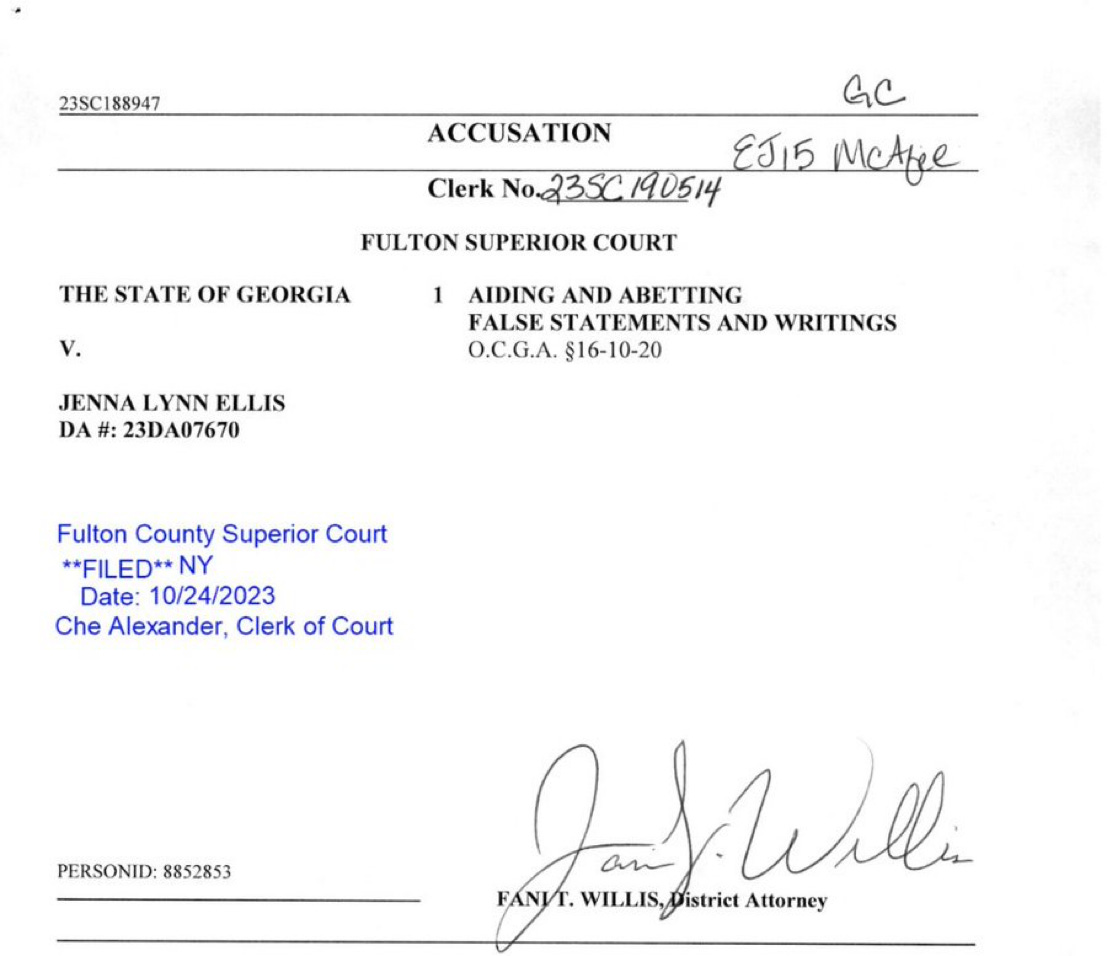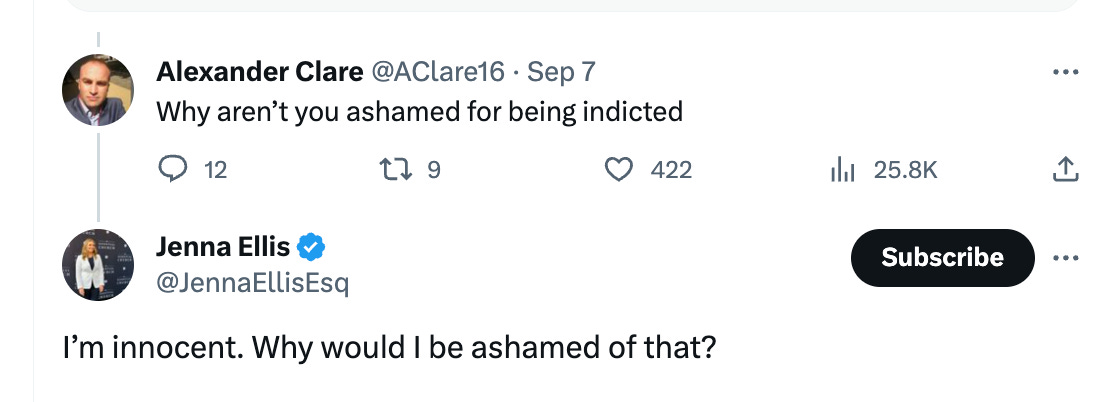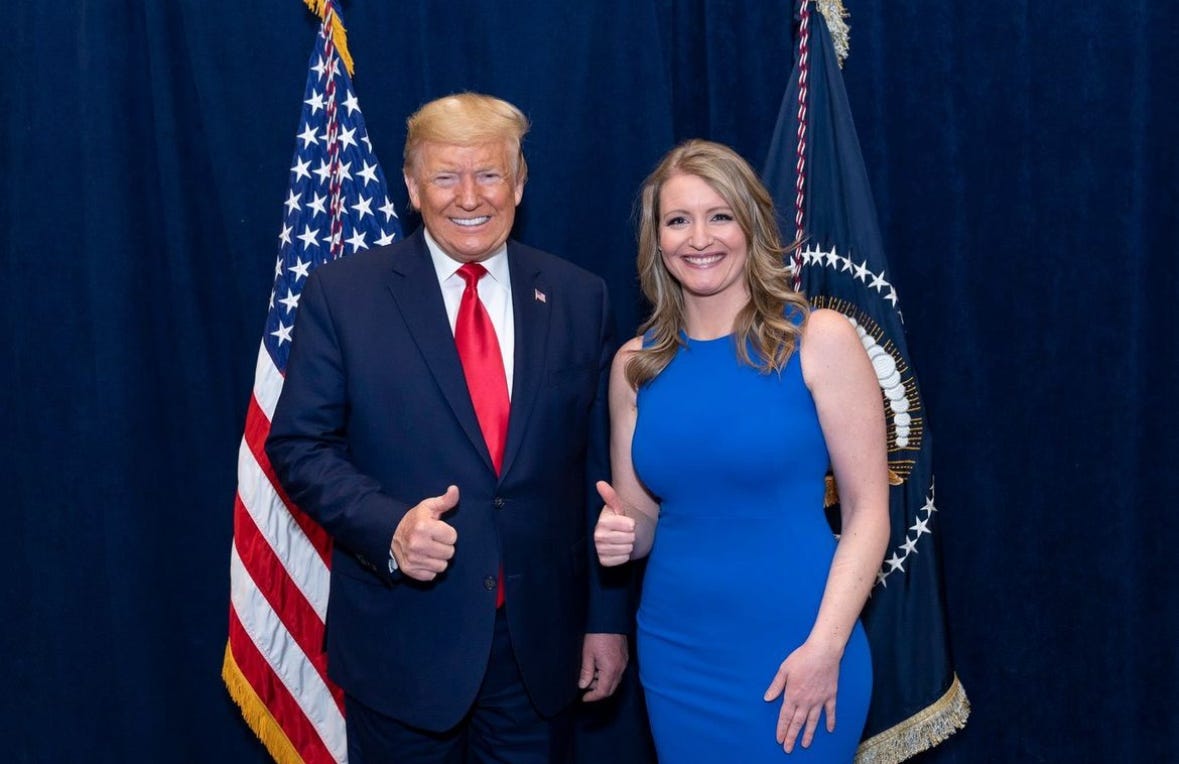Cooperation vs. Immunity
The Trump administration brought out the best and the worst in lawyers. Early on, as a shell-shocked nation watched civil rights abuses take shape, it was the lawyers who flocked to airports to try and intervene in Trump’s Muslim ban. Civil rights lawyers who tried to help migrants who were being denied the right to seek asylum and separated from their children. When Trump fired FBI Director Jim Comey, DOJ lawyers joined Special Counsel Robert Mueller’s team. Lawyers were the guardrails, including the acting attorney general, acting deputy attorney general, and lawyers in the White House who thwarted Trump’s efforts to steal the election outright. And judges, many of them Trump appointees, refused to aid and abet the Big Lie as Trump filed lawsuit after lawsuit. Lawyers were the heroes.
But Trump’s lawyers were a different story. In Jenna Ellis’ teary justification in court today as she pled guilty, she didn’t do her “due diligence.” Far too many Trump lawyers, just about everyone on his private legal team starting with Michael Cohen and ending with pleas in the last week from Sidney Powell, Kenneth Chesebro and Ellis tell the story of the bad lawyers. And there will be more. Lawyers who abandoned the Constitution in favor of their own personal dreams of fame and power.
Jenna Ellis is today’s winner in the “tweets that didn’t age well” category.
Her guilty plea today, which includes a full cooperation agreement, may prove to be the most important one yet. Ellis is now obligated to meet with prosecutors for interviews, provide further statements as necessary, and to testify at hearings and trials. Her testimony is certainly bad news for Rudy Giuliani, who called her his number two. She had frequent access to others, including Trump. And there has been some suggestion that she was responsible for bringing John Eastman on board. Plenty of reason for her remaining co-defendants to be very nervous.
But it’s the substance of Ellis’ plea that’s most interesting. It’s highly specific, identifying false statements Ellis helped Rudy Giuliani and Ray Smith, another of her co-defendants, make to Georgia state senators. Those statements, which she is now admitting were false, form the core of the Big Lie, the idea that Trump would have won the election but for rampant voter fraud that changed the count. Of course, we all know that to be untrue. But now, for the first time in court, one of Trump’s key allies, one of the bad lawyers, is saying it’s not true, as well.
Ellis’ plea agreement is a confession that she was involved in telling seven lies to Georgia senators, presumably in an effort to convince them to participate in the fake electors scheme:
there were 96,000 fraudulent mail-in ballots that got counted
2,506 felons voted illegally
66,248 underage people illegally registered to vote
2,423 unregistered people voted
1,043 people, who had illegally registered because they used a post office box instead of a physical street address, voted
At least 10,315 dead people cast ballots
Fulton County election workers at the State Farm Arena expelled poll watchers and the media while votes were being counted and continued their work with no oversight
All lies. The basis for her plea is that all of Trump’s claims of election fraud in Georgia were a lie—and that his lawyers, at least, knew it
Interestingly, these same types of lies formed the backbone of all of Trump’s claims of fraud: illegal registrations, illegal votes, and improper practices in vote counting. Jenna Ellis will now testify that none of it was true, although we still don’t know whether she can testify that Trump, as well, knew it was one falsehood after another.
What seems certain is that Jenna Ellis is now on track to be Trump’s newest covfefe boy. Just like Sidney Powell was never his lawyer. But it’s going to be interesting to try to watch him distance himself from her.
The four plea agreements Willis now has under her belt add up to more than the sum of their parts. That’s because each defendant has pled guilty to a different part of the RICO scheme and can provide testimony about others and their involvement in a synergistic way. It’s not just that Ellis can testify about the seven lies. She can, presumably, testify to each member of the conspiracy and what her interactions were with them, perhaps comments they made or activity she observed about other parts of the plan as well. And there’s likely to be just that much more pressure on defendants who have yet to plead guilty—it’s to the point where no one who has an option wants to be left behind to face prison with Trump. Powell and Chesebro’s pleas put pressure on Ellis. Her decision has the same affect, especially on the remaining lawyers.
Ellis, in the statement she read to the court, said, “I failed to do my due diligence. I believe in and I value election integrity. If I knew then what I know now, I would have declined to represent Donald Trump in these post election challenges. I look back on this whole experience with deep remorse.” Not a shining moment for a lawyer or for the legal profession.
Ellis is a cooperating co-defendant. Having been charged with crimes, she entered into a plea agreement with the DA and is receiving (extremely) favorable treatment in exchange for her full cooperation. Although there was an initial burst of excitement when ABC ran a story earlier today about Mark Meadows, his situation is a different one. There is no news about Meadows’ situation in Georgia, where he is under indictment. ABC reported that he had testified before a grand jury in Washington, D.C. in the special counsel’s election interference case there.
Meadows does not appear to be cooperating with prosecutors. Instead, the reporting suggests that he testified under a grant of immunity. This suggests Meadows isn’t on board to cooperate with prosecutors and tell them the truth about everything he knows. He is not indicted in the Washington, D.C. case and did not receive any sort of deal connected to potential charges against him, that we know of. Instead, he was compelled to testify by the government’s grant of immunity, which removes any sort of Fifth Amendment right against self-incrimination concerns because prosecutors give up, at least in a limited way, their ability to prosecute.
There are two different types of immunity the government can give here. It’s not clear from the reporting which one is in play. “Transactional immunity” protects a witness from prosecution for any offenses they testify about. “Use immunity” means the government cannot use the witness’s testimony to make the case against them (except in a subsequent perjury/false statements case), although they can still prosecute.
Longtime readers of Civil Discourse will recall that back in May we openly speculated about what was going on with Meadows, who had all but disappeared from public life.
I noted that the sort of low profile he was keeping is something I normally associate with someone who has decided to plead/cooperate/testify, but that in Trumpworld, people didn’t really cooperate. And Mark Meadows didn’t seem like the kind of bold, courageous guy who would be willing to go first.
Then on June 6, the New York Times ran a story confirming Meadows had testified before the special counsel's grand jury, although it was unclear whether it was about the Mar-a-Lago case, the D.C. case, or both. I speculated that perhaps he was immunized to testify—it was hard to imagine him doing it otherwise, because it could have well led to an indictment if he was truthful or a perjury charge if he was not. Now, ABC has confirmed Meadows testimony took place under a grant of immunity, although we’re still a little shy on details.
ABC’s reporting is that Meadows told prosecutors he agreed the 2020 election was the most secure in American history and that he had repeatedly told Trump that the allegations of voter fraud lacked any merit. But Meadows’ attorney was quick to deny the story. He told NBC’s Kristen Welker that the ABC story was “largely inaccurate.” That seems to confirm that Meadows hasn’t “flipped” in the traditional sense like Ellis has and that he isn’t cooperating with prosecutors.
Meadows status in Jack Smith’s case has always been something of a curiosity. He was not indicted, nor does he appear to be among the unnamed, unindicted co-conspirators in that case. He could be important. He was one of just a few aides at Trump’s side as the insurrection unfolded. He was in on Trump’s phone call to Brad Raffensperger, where Trump begged Georgia's Secretary of State to “find” him enough votes for the win. Meadows’ texts were a treasure trove for the January 6 committee. If Meadows ever decides to cooperate it would be a big deal. But that’s not what this appears to be.
But Meadows, whatever deal he may have in the District of Columbia, is still a defendant in Georgia. Perhaps he convinced federal prosecutors that he had no criminal culpability but still required immunity to ensure he would not be charged before he would agree to testify before the grand jury. Perhaps he intends to fight it out in Georgia because Fani Willis wouldn’t give him that same deal. Or perhaps Meadows will join the chorus of those seeking deals in Georgia. But if Meadows is convicted or has to plead to a felony to get a deal in Fulton County, Jack Smith will be left with egg on his face if Meadows walks away uncharged in the larger federal case.
So far, Meadows’ lawyers have been able to keep him walking on a tightrope between abandoning Trump and accompanying him to prison when it comes to Jack Smith. But not so much in Georgia, where Meadows is among the defendants. Although his Eleventh Circuit appeal, his effort to remove his case from state court to federal court, won’t be heard until next month, and perhaps he’s still holding out some hope the court of appeals will rescue him, Meadows is rapidly reaching the point where he’s going to have to pick a side. That’s something he’s managed to avoid doing up until now.
We’re in this together,
Joyce






Jenna is remorseful only because she was caught, indicted and doesn't have the financial backing for huge legal bills. She knowingly lied and didn't care about the consequences until they bit her on the butt.
When Jenna read her statement, I was reminded of Tammy Faye Baker.